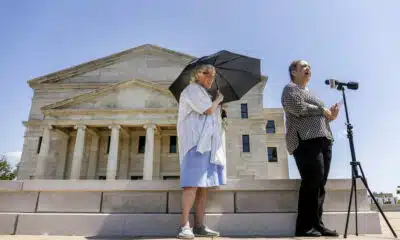Mississippi News
Legislative leaders weigh stripping Supreme Court’s ability to give own raise
Legislative leaders weigh stripping Supreme Court’s ability to give own raise
The Mississippi Supreme Court did not testify during the one day of public hearings held recently by the influential Legislative Budget Committee, but that does not mean the justices were not discussed.
Supreme Court Chief Justice Michael Randolph’s interpretation of a law enacted in 2012 that he says grants him the authority to give the state’s judiciary a pay raise without legislative approval was an undercurrent of the meeting of legislative leaders.
Actually, for Lt. Gov. Delbert Hosemann, it was more than an undercurrent.
“I just think it is appropriate for the Legislature to do the appropriations,” Hosemann said. “That is what people hired them (legislators) to do. I don’t think there should be an exception to that.”
Hosemann, of course, was referring to the classic, old school breakdown of the responsibilities of the three branches of government: the legislative branch makes the laws and appropriates funds, the executive branch carries out those laws, and the judiciary interprets the laws.
Randolph would argue lawmakers in the 2012 legislation relinquished to him the authority to appropriate money for the judicial pay raises.
Starting after 2019, the 2012 law called for the Supreme Court justices and other judges to receive an automatic pay raise if funds are available, based on a determination of “an adequate level of compensation” as determined by the state Personnel Board. That board regularly conducts studies to determine the salary levels for state employees based on various factors, such as pay for similar positions in the private sector and in neighboring states. Until the 2012 law, the Personnel Board had not been involved in the issue of providing pay raises for the judiciary. That had been left up to the Legislature as it continues to be for other state elected officials.
The 2012 law increased the fees on various court filings — such as the fee to file a civil lawsuit or on the levies in criminal proceedings — to help pay for the salary increase. Some argued at the time the increase on the court filings was equivalent to a tax increase for those who use the courts. But then-Chief Justice William Waller Jr., who advocated for the 2012 legislation, said judges at the time desperately needed a pay increase and he was trying to be responsible by providing a method to pay for it.
What was not clear at the time, at least to many legislators, is that the law would be used by the chief justice to bypass the Legislature to provide a pay raise for himself and other members of the judiciary.
In the 2020 session, House Appropriations Chair John Read, R-Gautier, authored legislation that would have provided a judicial pay raise but would have removed the 2012 language that allowed the judges to set their own salary based on the Personnel Board report. The legislation passed the House, but died in the Senate Appropriations Committee, chaired by Sen. Briggs Hopson, R-Vicksburg.
In September 2020, less than six months after the 2020 legislation died, Randolph contacted the Personnel Board inquiring about its salary recommendation report for the judiciary. That recommendation was for about a cumulative $2 million increase for state judges starting in January 2021 — a pay increase greater than what was proposed in the 2020 House bill. Randolph enacted the pay raise based on that report.
During last week’s Legislative Budget Committee meeting, House Pro Tem Jason White, R-West, asked questions about one of the guidelines the legislative leaders adopted for developing a budget – a requirement that any across-the-board pay raise for an agency had to be approved by the Legislature.
“We got in a position, one particular agency where raises went into effect and we were kind of in a take it or leave it scenario,” White said.
“You mean the Supreme Court?” asked Hosemann.
“Yes sir,” White replied.
Referring to the 2012 law, Hopson said, “I think the statute probably trumps what we do…When we get back into session there needs to be something that confirms this (guideline.) We probably need to adjust the statute.”
Whether Hopson and other legislators will be willing to take the power to provide their own raises away from the judiciary remains to be seen. Many of the top legislative leaders are attorneys who often must appear before Randolph and the other justices in their private lives to argue cases. They might be reluctant to incur the ire of the Supreme Court.
Hosemann also is an attorney, but at age 75 has directed most of his active work life away from private law practice and toward public service, where he believes in the system set out by the nation’s and state’s founding fathers where the legislative branch appropriates public funds.
This article first appeared on Mississippi Today and is republished here under a Creative Commons license.
Mississippi News
Defendant in Mississippi auditor’s ‘second largest’ embezzlement case in history goes free
SUMMARY: Four years ago, Tunica nonprofit operator Mardis Jones was arrested for allegedly embezzling over $1 million from a county home rehabilitation program funded by casino revenue. The state auditor accused Jones of misusing funds meant to help vulnerable residents, claiming little money reached contractors. Jones’ defense cited poor program administration and insufficient evidence of theft, with a jury ultimately acquitting him last month. Despite the criminal acquittal, the auditor’s office demanded repayment through a civil claim, which the attorney general’s office had yet to act on, but recently confirmed receipt of the demand letter. The case highlights issues in government oversight and program management.
The post Defendant in Mississippi auditor’s ‘second largest’ embezzlement case in history goes free appeared first on www.wjtv.com
Mississippi News
Events happening this weekend in Mississippi: June 27-29
SUMMARY: This weekend (June 27-29) in Mississippi offers a variety of events across the state. Central Mississippi hosts the Kiwanis Club of Pearl Golf Tournament, multiple hot air balloon events including the Mississippi Championship Hot Air Balloon Festival in Canton, and exhibitions like Hurricane Katrina: Mississippi Remembers in Jackson. There are also family-friendly activities such as Guys and Dolls Jr. in Natchez, Pilates and yoga events in Jackson, and farmers markets in Jackson, Natchez, and Vicksburg. The Pine Belt region features Story Time with a Soldier in Hattiesburg, immersive theater experiences, karaoke, and runs supporting recovery programs in Laurel.
The post Events happening this weekend in Mississippi: June 27-29 appeared first on www.wjtv.com
Mississippi News
Traveling for July Fourth? When to expect the worst traffic, busiest airports
SUMMARY: With the Fourth of July on a Friday, AAA expects a record 72.2 million Americans to travel domestically over the long weekend, including 61.6 million by car—a 2.2% increase from last year. Busiest driving days are July 2 and 6, with afternoon hours the most congested. Major highways in cities like Atlanta, Boston, Chicago, and New York will see peak traffic. AAA advises early departures and vehicle maintenance. TSA anticipates 5.84 million air travelers during the week, a 1.4% increase, with July 6 the busiest airport day. Popular destinations include Orlando, Seattle, and New York, while Vancouver tops international spots.
The post Traveling for July Fourth? When to expect the worst traffic, busiest airports appeared first on www.wjtv.com
-
News from the South - Tennessee News Feed6 days ago
Thieves take thousands of dollars in equipment from Union County Soccer League
-
Mississippi Today4 days ago
Defendant in auditor’s ‘second largest’ embezzlement case in history goes free
-
News from the South - Texas News Feed6 days ago
Robert Nichols to retire from Texas Senate
-
News from the South - Louisiana News Feed6 days ago
3 lawsuits filed against CVS, Louisiana AG announces
-
News from the South - Missouri News Feed6 days ago
Residents provide feedback in Kearney Street Corridor redevelopment meeting
-
News from the South - Alabama News Feed6 days ago
News 5 NOW at 12:30pm | June 24, 2025
-
The Conversation6 days ago
The Vera C. Rubin Observatory will help astronomers investigate dark matter, continuing the legacy of its pioneering namesake
-
News from the South - Florida News Feed6 days ago
DeSantis signs bill into law that ensures public access to Florida beaches | Florida












































